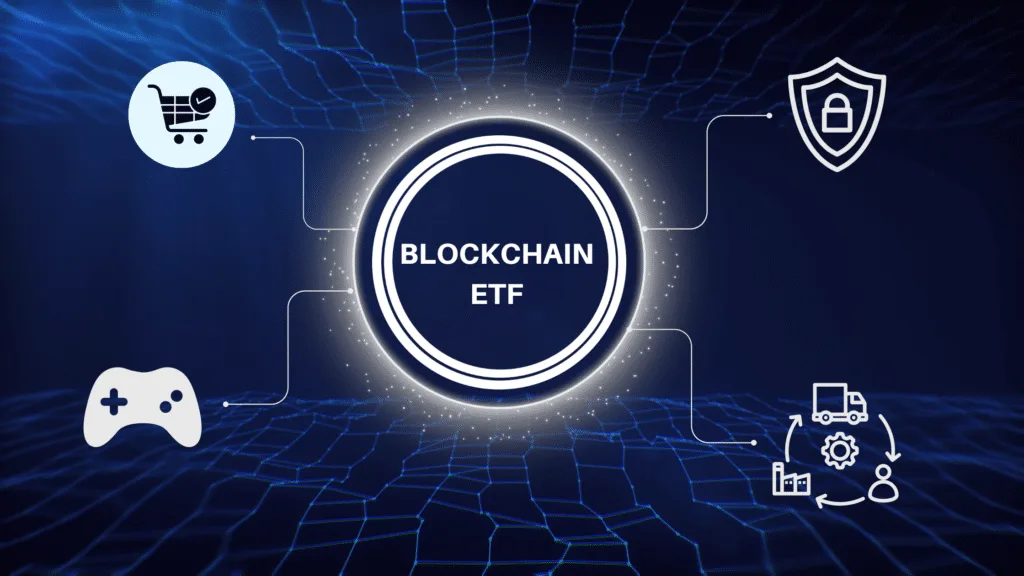What is a Blockchain ETF?
An ETF is an exchange-traded fund that can be bought and sold like stocks. ETFs often have a basket of securities, such as stocks, bonds, or other asset classes like precious metals or currencies, or transportation.
A blockchain ETF is an exchange-traded fund that consists of securities from companies dealing in blockchain technology.
The Long Definition
A blockchain exchange-traded fund (ETF) is a type of pooled investment product. It consists of securities from different blockchain-based companies pooled into one basket that people can buy into.
Therefore, these ETFs track the performance of firms invested in blockchain technology. And, like all ETFs, each is based on several companies to diversify the portfolio.

How Do Blockchain ETFs Work?
To understand blockchain ETFs, you have to first understand ETFs. An ETF is a group of products that usually have something in common. Sometimes the products are a reflection of the exchange they are traded on.
So, a technology-focused exchange would probably have several technology-focused ETFs. Other times they are publicly traded companies from a particular industry.
These funds are created by putting several small products together in a group. You can think of it as a basket. This basket holds a variety of assets – like stocks, bonds, and/or commodities – from different companies.
An ETF is created when an authorized party buys all underlying securities in bulk. This is usually a professional broker. Their role involves getting securities from different firms and putting them into the basket mentioned above.
They then break the group up into shares. Each share has a small piece of all the products that have been grouped together.
These shares are what regular investors buy. Their price depends on the performance of the companies in the bundle and changes in real-time, just like regular shares.
That’s how a blockchain ETF works. The professional broker buys securities from blockchain-based firms. These are firms that are involved in blockchain technology.
This doesn’t mean that they have to deal with cryptocurrencies directly such as Binance and Coinbase. Some companies included in blockchain ETFs are there because they conduct research on blockchain technology.
For others, blockchain is a huge part of their primary operations, like EvaCodes for example, or a segment of their business, like IBM and PayPal.
Usually, a single ETF will include several companies. It can have securities from PayPal, IBM, Block Inc, Google, and many more. This helps create a diverse investment portfolio.

What is the difference between blockchain ETFs and crypto ETFs?
Blockchain ETFs aren’t the same as crypto ETFs. Blockchain ETFs invest in blockchain-based companies while crypto ETFs invest in cryptocurrencies like Bitcoin (BTC) and ether (ETH). So while a Bitcoin ETF tracks the price of Bitcoin, a blockchain ETF tracks the stocks of firms investing in blockchain technology.
By investing in companies, blockchain ETFs offer a more stable investment. This is because company shares are less volatile than cryptocurrencies. So, there are clearer regulations surrounding them.
For example, the Securities Exchange Commission (SEC) of the United States recognizes and approves Blockchain ETFs but has yet to approve most crypto ETFs.
Blockchain ETF examples
There are many blockchain ETFs out there. Some notable examples include:
- Siren Nasdaq NexGen Economy ETF (BLCN)
- Global X Blockchain ETF (BKCH).
- VanEck Digital Transformation ETF (DAPP)
- Bitwise Crypto Industry Innovators ETF (BITQ).
Why you might want to invest in blockchain ETFs
Blockchain ETFs come with several benefits, such as:
- They carry less risk than cryptocurrencies: Company shares are generally less volatile than crypto.
- They offer a diversified investment: Having securities from different companies diversifies the investment. This means you’ll still be safe even if one company underperforms.
- Many blockchain ETFs bring positive returns: Blockchain technology is rapidly expanding into traditional business industries like healthcare and entertainment.

Why you might not want to invest in blockchain ETFs
Blockchain ETFs also have their downsides:
- Institutional investors create blockchain ETFs. They manage the securities on behalf of regular investors. This creates additional costs in the form of management fees.
- Blockchain ETFs are a new addition to the market. Thus, a lot of people question their long-term prospects.
Wrapup
Blockchain technology is here to stay, and it’s growing fast. Blockchain ETFs allow the regular person to easily take advantage of this opportunity. Because many firms are exploring blockchain, ETFs are more diverse and stable. This makes them more attractive to investors.
But before you commit, remember to do your own research. LEARN BEFORE YOU LEAP.
